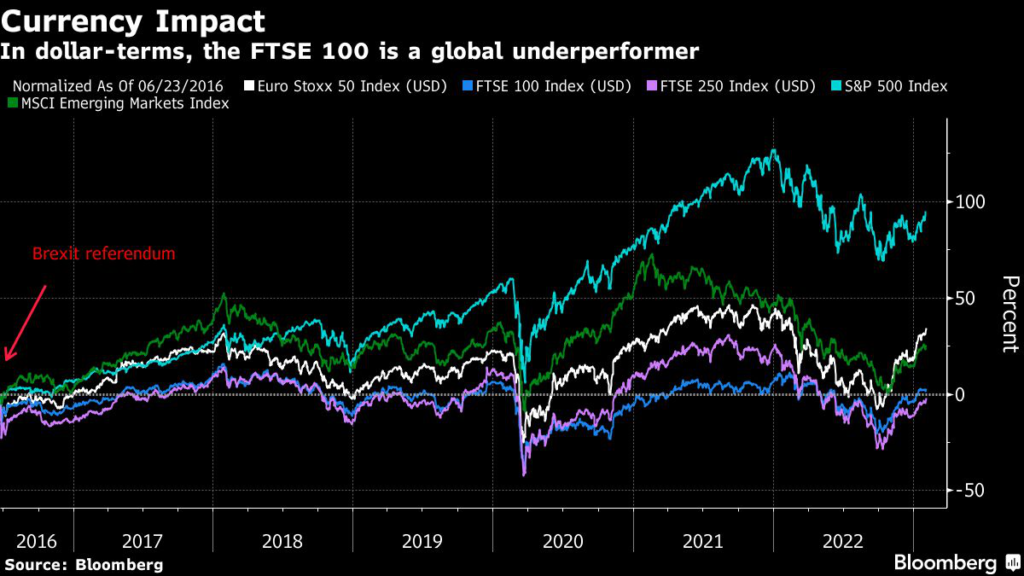For the first time since 2018, Britain’s blue-chip stocks have closed at an all-time high.
(Bloomberg) — For the first time since 2018, Britain’s blue-chip stocks have closed at an all-time high.
The FTSE 100 Index climbed 1% on Friday to a record of 7901.80 as the pound slumped after the US dollar rallied on stronger-than-expected jobs data. Having managed to avoid a selloff last year on the sterling’s weakness, the FTSE 100 Index has joined a global equities rally in 2023 with a 6% gain, helping the British large-cap benchmark scale an all-time high.
The gauge advanced in 2022, marking the first outperformance in a decade against the MSCI World Index. Dominated by firms such as HSBC Holdings Plc and Shell Plc., that earn most of their sales from outside the UK, the blue-chip index typically benefits from a weaker pound, with the currency falling about 10% last year.
What’s more, the index’s heavy weighting skew toward commodity and banking stocks has meant that many macroeconomic factors — high interest rates and inflation — that were headwinds for US and Europe partly acted as positive catalysts for the FTSE 100. Investors in UK large caps are also enjoying solid dividends, with one of the highest payout yields globally. China’s economic reopening and lower gas prices caused by mild winter weather have added more fuel to the rally, lifting up a broad swath of European companies.
“If we were to enter a global recession, then the defensive nature of FTSE 100 will remain attractive,” said Janet Mui, head of market analysis at RBC Brewin Dolphin. “Energy and material sectors may also benefit if China sees a successful reopening.”
Still, there are plenty of risks ahead. A recovering pound, stalling commodities rally and the end of a quick burst in demand from China reopening may start weighing on the benchmark.
Though the UK index’s fortunes are not a reflection of Britain’s economy, pound’s swings are. The sterling has risen about 13% from a record low in September driven by hopes that the UK economy may avoid tumbling into recession until later this year as well as a reversal in ex-Prime Minister Liz Truss’s unfunded tax cuts plans.
“The risk is a recovery in the pound may be a headwind,” added Mui.
Brexit Blues
Notably, the FTSE 100 is one of the last European benchmarks to scale pre-Covid highs.
Since the Brexit vote in 2016, the sterling’s slide has been a big factor in driving the index’s underperformance, turning away international investors. Some even squarely ignored British stocks due to the pound’s volatility on economic fallout from the break-up with the European Union, unpredictable politics and on the lack of popular high-growth stocks, like the US Big Tech.
All of that has left the FTSE 100 still trailing behind most of the developed market indexes. In dollar terms, the index is pretty much flat since June 2016, while the S&P 500 is up nearly 100% and Euro Stoxx 50 has risen over 30%.
Last year the UK also lost its crown as Europe’s biggest stock market. The combined market capitalization of primary listings in Paris — excluding ETFs and ADRs — was $3.2 trillion as of Feb. 2 versus London’s $3.05 trillion, according to data compiled by Bloomberg.
–With assistance from Michael Msika.
More stories like this are available on bloomberg.com
©2023 Bloomberg L.P.










